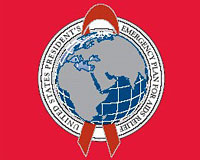| Working with Faith-Based and Community-Based Organizations (January 2007) PDF version PDF version
 |
President George W. Bush's
Emergency Plan for AIDS
Relief is the largest commitment
ever by any nation for an
international health
initiative dedicated to
a single disease-- a
five-year, $15 billion,
multifaceted approach to
combating the disease
around the world.
U.S. Department of
State
U.S. Agency for
International
Development
U.S. Department of
Defense
U.S. Department of
Commerce
U.S. Department of
Labor
U.S. Department of
Health and Human
Services
Peace Corps
Mailing address:
SA-29, 2nd Floor
2201 C Street, NW
Washington, DC 20522-2920
www.PEPFAR.gov
| |

Working with Faith-Based and Community-Based Organizations
Faith-based organizations (FBOs) and community-based organizations (CBOs) possess an extensive geographic reach and a well-developed infrastructure in the developing world. Working under national strategies and in coordination with host governments, the U.S. President’s Emergency Plan for AIDS Relief (Emergency Plan/PEPFAR) draws upon the capabilities of these organizations to contribute to an effective, multi-sectoral response to the HIV/AIDS pandemic.
|
Building FBO and CBO Capacity:
- Under the New Partners Initiative (NPI), the Emergency Plan will award a series of grants totaling approximately $200 million to new partners to provide prevention and care services in the Emergency Plan’s 15 focus countries. NPI seeks out organizations that have the capability to reach people who need HIV/AIDS services, but lack experience in working with the U.S. Government and its processes. By identifying and supporting the organizations that provide much of the health care in the developing world, PEPFAR resources will reach more people, more effectively.
- The HIV/AIDS Twinning Center supports strengthening of human and organizational capacity through the use of health care volunteers and twinning relationships to facilitate skills transfer and rapidly expand the pool of trained health care workers. Twinning partnerships with FBOs and CBOs have demonstrated success in facilitating HIV/AIDS stigma reduction communication at the local level.
- USAID and HHS Centers for Faith-Based Initiatives, created by President George W. Bush, help to empower FBOs to apply for federal social service grants. The centers supply information and training to organizations.
|
Partnering with Faith-Based and Community-Based Organizations
With networks that reach even the most remote villages, many FBOs and CBOs are uniquely positioned to promote HIV/AIDS stigma reduction and prevention messages, as well as to provide counseling and testing, home care, clinical services, and antiretroviral treatment. These organizations also have the ability to influence the attitudes and behaviors of their community members by building on relationships of trust and respect. These attributes make their partnership a valuable asset in the fight against HIV/AIDS.
The Emergency Plan prioritizes the development of partnerships with FBOs and CBOs as a key strategy for increasing access to services and building sustainability. The reality is that the fight against HIV/AIDS in hard-hit nations will have to continue for the long term. This fight will be sustainable only if it is owned by the people of each country. Building the capacity of FBOs and CBOs not only increases the number of individuals with access to services, but also increases local ownership of the response to HIV/AIDS. |
|

The Emergency Plan at Work:
The following are a few examples of how the Emergency Plan is working under national strategies and in partnership with host nations to support and strengthen FBOs and CBOs:
- In Nigeria, the local chapter of the Society of Women and AIDS in Nigeria (SWAAN) in Kano is active in the fight against HIV/AIDS. SWAAN members, all of whom are from the local community and many of whom are living with HIV/AIDS, conduct HIV education sessions, care for HIV-positive women and affected families, and provide HIV counseling and testing services through outreach to local communities.
- In Tanzania, PASADA, a social service agency operating under the Roman Catholic Archdiocese of Dar Es Salaam, provides spiritual, social, medical and material support for people living with and affected by HIV/AIDS. PASADA documented their best practices and developed a community educator’s manual for dissemination to organizations throughout the country. PASADA is extending its radio broadcasts to emphasize community-led responses in the fight against HIV/AIDS and to examine community-led psycho-social support and stigma reduction activities.
- In India, CBO partners are working to find solutions for meeting the increasing demands for care and support for people living with HIV/AIDS. The Emergency Plan supports efforts to pioneer a new comprehensive care model, through which people living with HIV/AIDS and their families are provided with improved health care, psychosocial and economic support, and prevention services. Reaching into the community, the project has established and trained a cadre of community members, many of whom are HIV-positive themselves, to serve as "peer" community health workers. Community health workers provide critical information on counseling, treatment of opportunistic infections, and antiretroviral treatment.
- In Namibia, a PEPFAR partner organization works with the government of Namibia to strengthen a network of local FBOs through technical assistance and training in program management, finances, and monitoring and evaluation. Services provided by the network of faith-based organizations include HIV counseling and testing services; support groups; antiretroviral treatment; prevention of mother-to-child HIV transmission programs; care and support for orphans and vulnerable children; and training for counselors for both government-managed and community-based programs.
- In Burma, a Buddhist monastery is working to address HIV/AIDS by promoting information sharing and open discussion about HIV/AIDS between parents, teachers, youth and people living with HIV/AIDS. During the Buddhist coming-of-age ceremony, Shin Pyu, the monastery has committed to a soap opera series about HIV/AIDS. At the festival, over 1,000 villagers of all ages viewed the drama. The monastery not only committed to screen the series during the Shin Pyu festival, but also throughout the year.
|
|
| |  |  |




 PDF version
PDF version